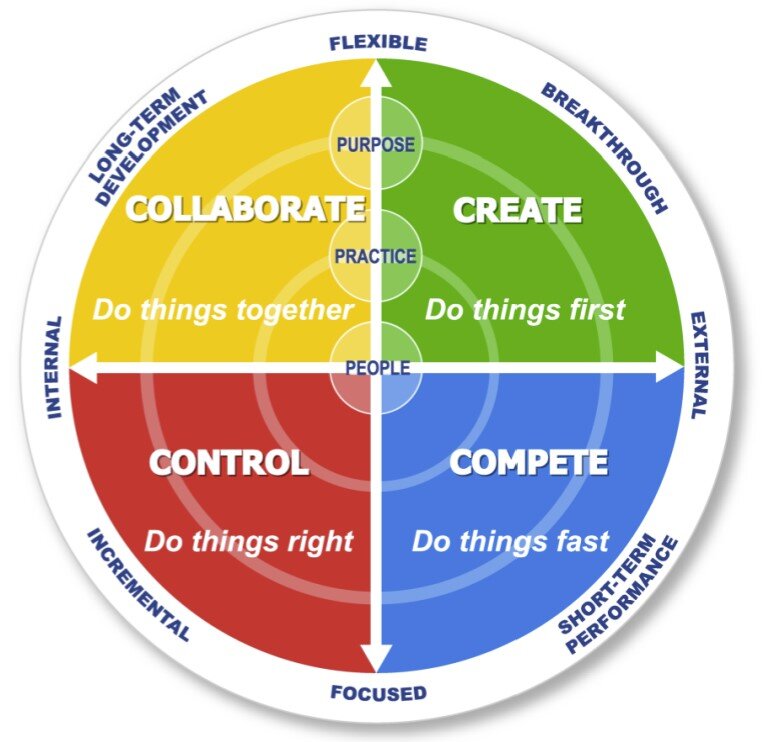LICENSING Kim’s Instruments
Kim is the creator of the widely-used Organizational Culture Assessment Instrument (OCAI), the Management Skills Assessment Instrument (MSAI), and others listed below.
VISIT WWW.OCAI-OFFICIAL.COM TO TAKE SAMPLE OCAI and MSAI SURVEYS!
If you would like to use the Culture Assessment or any other instruments, please email Kim’s team at team@kimscameron.com. We can distribute the instrument on-line, tabulate scores, and produce feedback reports for a fee. These reports include comparison data from approximately 10,000 organizations--representing many industries and sectors, five continents, and approximately 100,000 individuals. We can provide additional services, such as presenting to your organization virtually or in person!
Graduate students may use the instruments for non-revenue-generating, research purposes only. Please email us for our Student Permission Letter.
Kim has produced widely used research instruments and assessments, including:
OCAI (Organizational Culture Assessment Instrument) based on the Competing Values Framework
MSAI (Managerial Skills Assessment Instrument) based on the Competing Values Framework
MASI-e (Managerial Skills Assessment Instrument for Executives) based on the Competing Values Framework
Leadership Competencies Assessment (In-class) based on the Competing Values Framework (with Robert Quinn)
Performance Outcomes Assessment (In-class) based on the Competing Values Framework (with Robert Quinn)
Personal Orientation Assessment (In-class) based on the Competing Values Framework (with Robert Quinn)
Change Strategies Assessment (In-class) based on the Competing Values Framework (with Robert Quinn)
Leadership Competencies Survey
Survey of Organizational Abundance
Assessment of Positive Practices in Organizations
Learn more about each below!
Copyright Notice: Kim’s instruments and publications are fully copyrighted. His instruments must only be used with permission and a licensing agreement in place. Please contact Kim’s team for licensing terms.
Organizational Culture Assessment Instrument (OCAI)
Developed by © Kim Cameron and Robert Quinn at the University of Michigan, OCAI is a validated research method to assess organizational culture.=It is based on the Competing Values Framework: one of the most used and useful frameworks in business (ten Have, 2003). Over 10,000 companies used it. It is well-researched and validated, but also compact with six aspects that reliably represent an organization's culture. The OCAI is a quick culture tool where you distribute 100 points between four “Competing Values”.
These four Competing Values correspond with four types of organizational culture. Every organization has its own mix of these four types of organizational culture.
The Competing Values Framework (CVF) emerged from research to identify the organizational effectiveness criteria (Quinn & Rohrbaugh, 1981). The criteria that were found to make a difference are the dimensions internal-external, and stability-flexibility.
Managerial Skills Assessment Instrument (MSAI)
The purpose of this assessment is to help you identify key areas of your managerial competency. What are your managerial strengths, and in what areas will you want to improve? The assessment produces a map of your managerial competencies based on factors that have been found to predict managerial success. That is, whereas no person possesses proficiency in all possible competency areas, the competencies included in this instrument are all associated with high managerial and organizational performance. Your profile helps identify your own areas of strength and capability. It also provides a profile of the kinds of competencies that you will need if you are to accomplish your highest aspirations in the future. The instrument helps you compare your current competencies, in other words, with those required for you to be a spectacular success as a manager.
Because it is based on the Competing Values Framework, the Managerial Competencies Assessment helps to create a common language among employees and gives them an easy way to be clear about desired results. This provides a way to discuss the organizational culture, capabilities, performance outcomes, personal orientation issues, and change processes that can all be used to bring about the desired results.
The best way to obtain useful data is to complete this instrument yourself and then have a set of associates—superiors, peers, and subordinates—also complete the instrument rating you as the focal person. This provides “360 degree feedback” and allows you to compare your own perceptions with those of others.
The Competing Values Culture Assessment
The purpose of this assessment is to diagnose your organization’s current and desired culture. Unfortunately, most of us are not even aware of our organization’s culture inasmuch as culture represents “just the way things are around here.” Culture is the sum of the collective assumptions, expectations, and values that reflect explicit and implicit rules in the organization. Until challenged or violated, most people are not even aware that these assumptions and rules exist (such as speaking English or being polite). As a result, it is very difficult to intelligently discuss culture, not to mention try to change it.
This instrument helps identify the cultural profile of your organization which is a prerequisite for fostering organizational change and improvement. Because the instrument is based on the Competing Values Framework, it can help create a common language among employees within your organization and give them an easy way to discuss how to effectively achieve desired results.
These six questions ask you to identify the way you experience your organization right now, and, separately, the way you think it should be in the future if it is to achieve its highest aspirations. In the survey, “the organization” refers to the organization managed by your boss (or the organization in which you manage).


